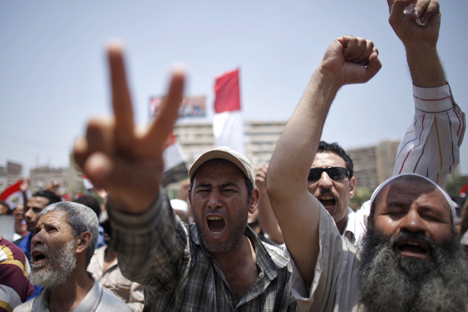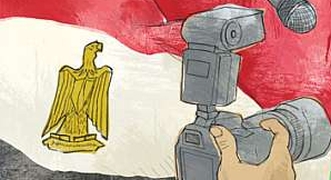Five lessons from the military-street coup in Egypt

Although the majority of Egypt's population is Muslim, the establishment of an Islamic state without economic prosperity was clearly not what was expected after the overthrow of Mubarak. Source: Reuters
Revolutions and upheavals in the Middle East have become more frequent than elections in the West. Commentators and experts have identified the main trends as the situation unfolds, and warn that the chaos could soon spread to Russia's southern borders.
Lesson 1: No mobile phone, no power
The origin of the coup against Mohammed Mursi can be traced to the statement posted by Egypt's top brass on Facebook that the purpose of the military is to defend the nation from “terrorists, extremists, and ignoramuses.” And it ended when Mursi had his mobile phone confiscated, depriving him of access to Twitter and contact with the outside world.
Detained at an Egyptian military facility, Mursi suddenly became mute. He was unarmed and weak. It is a distinctive feature of this new type of coup: it begins online and ends when one of the parties is denied access to the virtual battleground.
Lesson 2: Feed first, then rule
The main complaint of the angry crowd against Mursi and the Muslim Brotherhood was not so much the Islamisation of society, but the lack of any reforms, save ideological ones. The attempt to usurp power without solving the problems that caused the revolution in 2011 (primarily of a socio-economic nature) quickly led to disappointment.
Although the majority of Egypt's population is Muslim, the establishment of an Islamic state without economic prosperity was clearly not what was expected after the overthrow of Mubarak. In the space of one year, many of those who rejoiced in Cairo's Tahrir Square came to the realisation that the old dictator could simply be replaced by a new one: a change of form without a change of content. The public's rising irritation (more than 22 million Egyptians signed a petition calling for the resignation of Mursi) lacked physical force — until the army stepped up to the plate.
Whoever eventually comes to power must solve the country's social and economic problems as a matter of urgency, otherwise they, too, will fall victim to the mob.
Lesson 3: Revolution erodes living standards
“The lesson is that revolutions should be avoided,” Sergei Karaganov, dean of the Faculty of World Economy and International Affairs of the Higher School of Economics, told Moskovskie Novosti. “Let's just admit that a revolution is, more often than not, simply an uprising. It has ended badly in Egypt. And the degradation will continue. When it will stop is anybody's guess.”
The second wave of revolution brought not only a sense of relief (the defeat of the Muslim Brotherhood was welcomed by those who feared an Islamist victory across the whole region), but additional problems: above all, a potential famine.
Lesson 4: After an uprising, find someone to take charge
Experts view the revenge of Egypt's military as the final nail in the coffin for the Arab Spring and so-called “Green Democracy,” i.e., Islamist rule. But one thing we can say for sure is that political Islam is poorly suited to the job of state governance. Mursi cleaned out the military from government posts and installed his own people — with the main criterion for selection being loyalty, not professionalism. So now the task is to form a team of managers that will address not the politics of the situation, but the economics.
Lesson 5: A crisis can occur anywhere
Despite all his mistakes and shortcomings, it should not be forgotten that Mursi was the first democratically elected president of Egypt. And the fact that he was removed from office by force can hardly be described a step forward. It is rather a consequence of the growing chaos throughout the Middle East as a whole.
Experts are of the opinion that the totality of local “chaos” is engendering a new Middle East with an entirely new configuration of forces. And there is no guarantee that the growing wave of political crises will bypass the countries directly south of Russia.
“Unfortunately, we face the prospect of living for decades with a crumbling, fragmenting Middle East, from which the threat of instability and terrorism could spring, including for Russia,” Karaganov says.
First published in Russian in Moskovskie Novosti.
All rights reserved by Rossiyskaya Gazeta.
Subscribe
to our newsletter!
Get the week's best stories straight to your inbox

